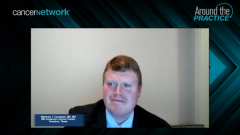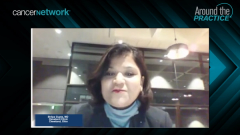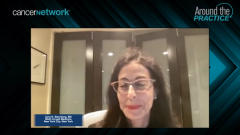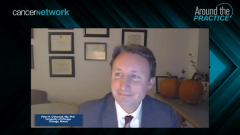
Metastatic Urothelial Carcinoma: Experience With Maintenance Avelumab
Experts highlight the benefits of frontline avelumab maintenance therapy in patients with metastatic urothelial carcinoma.
Episodes in this series

Transcript:
Peter H. O’Donnell, MD, PhD: Now we have our same 68-year-old man, remember he’s got lymph node and lung metastases, the PD-L1 [programmed death-ligand 1] is high, creatinine clearance is at 65, ECOG [Eastern Cooperative Oncology Group performance status] is 2. Indeed, in this case, we’ve got gemcitabine with carboplatin, got 6 cycles, and got a partial response. So here’s the audience question: Would you offer this patient maintenance therapy after his initial treatment? Yes, no, or not sure. Please choose 1. I know we were talking about this a little bit with the panel just now but we want to hear what you all think about offering maintenance therapy to this scenario. All right, so we are getting unanimous votes here that everybody would offer maintenance therapy for this patient. Which drug would you use as the maintenance therapy? This is, again, for the audience. We’ve got 5 choices here: Avelumab [Bavencio], nivolumab [Opdivo], pembrolizumab [Keytruda], atezolizumab [Tecentriq], or durvalumab [Imfinzi]? Please choose 1. It looks like we are getting, again, unanimous here around avelumab as the choice. So following the exact paradigm of the JAVELIN [Bladder] 100 data. We’ll go back to our panel and talk about the expectations here a little bit. So, first, everybody in the audience for the most part was picking avelumab. Maybe we’ll start with Matt, have you had some experience using avelumab for maybe audience members who haven’t had a chance to use it yet? Is there anything we have to look out for? How tolerable is the drug?
Matthew T. Campbell, MD, MS: Yes. I think avelumab is very well tolerated. You do have the risk of infusion reactions, which you’ll see typically within the first 2 or 3 doses and that makes it a little bit unique because the Fc [fragment crystallizable] portion of the antibody is altered in a way where as a result, you can have some infusion reactions potentially. But at this time, once you get past those potential infusion reactions, it has, I would say, an excellent safety profile similar to most of the other PD-L1 agents. I would say as a general rule, and what’s been reported in some meta-analysis, is that the side effect profile is a little bit more favorable with the PD-L1 agents as compared to the PD-1 [programmed cell death protein 1] in the composite.
Peter H. O’Donnell, MD, PhD: Shilpa, maybe I’ll ask you this, you know our audience said everybody would give avelumab offered to them here. Can you imagine a patient that maybe wouldn’t be ideal to offer the maintenance?
Shilpa Gupta, MD: Yes, Peter. I agree that the level of evidence is for avelumab, but we can’t always apply the drug for every patient out there. The two 2-week dosing is quite burdensome and that, that's a fact, which is a problem for a lot of patients. They end up missing so many doses because of bad weather or just the burden of the work. Based on the phase 2 trial of pembrolizumab, I do offer it to patients who I feel are not able to come in every 2 weeks. Granted, it was a smaller trial but two 6-week dosing does have certain advantages for some patient populations. So I do consider that as a choice in patients I feel wouldn’t be able to come every 2 weeks.
Peter H. O’Donnell, MD, PhD: Cora, you helped design this trial, as you talked about. That’s a question that I get a lot from patients, “Doctor, how long am I going to have to do this avelumab for?”
Cora N. Sternberg, MD: Well, the truth with avelumab is when I start telling [patients] every 2 weeks people are not very happy about it. In my experience, giving acetaminophen and an antihistamine, after a few cycles they would say, "Please take me off the antihistamine. It’s just making me sleepy. I don’t need this.” So I haven’t been seeing any kind of reactions at all in the patients that I’ve treated. The patients that I’ve treated, at least the New Yorkers I would say, are so happy to not be on chemotherapy. I mean the quality of life is so much better with immunotherapy, even if it’s every 2 weeks, that it hasn’t really been a huge problem for me, I would say. The patients here are motivated enough to come in every 2 weeks and they’ve done that. Every 6 weeks pembrolizumab is attractive but I think we have only a small phase 2 study that was done every 3 weeks. I don’t know where they came out with this every 6 weeks? From some lung data and all of a sudden they said it’s OK, but they won’t put it in any of their bladder protocols. So it’s a bit strange to me every 6 weeks, pembrolizumab, if we could really just switch 1 for the other. I understand it more in a country like Greece where they really don’t have access to avelumab.
Peter H. O’Donnell, MD, PhD: Matt, let me ask you the same question here. It seems somewhat easier for a patient to get their mind around; we’re going to do 4 to 6 cycles of chemotherapy, that’s a finite period of time. Are they really talking about avelumab forever?
Matthew T. Campbell, MD, MS: Yes, that’s a great question. I have patients that are nervous. I would say my experience is more so filled with renal cell when this happens, but we see it with urothelial as well, is the patient driving these conversations about stopping tend to be the patients that are experiencing extremely more durable timeline toxicity. I think my impression is with a single agent PD-1 or PD-L1 it’s a little different than when you have a combination with CTLA-4 and I think the relapse rate is likely going to be higher as compared to if you actually have CTLA-4 on board. So I would say that a 2-year mark is reasonable to consider stopping patients, or obviously, if your patients have toxicity, before then. But if patients wanted to continue, I can support that.
Transcript edited for clarity.
Newsletter
Stay up to date on recent advances in the multidisciplinary approach to cancer.










































